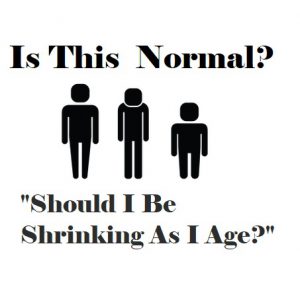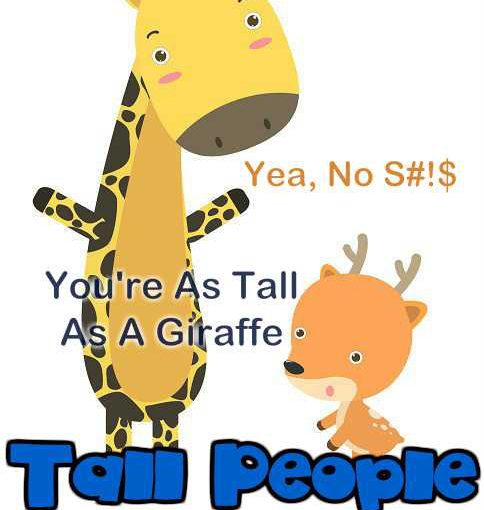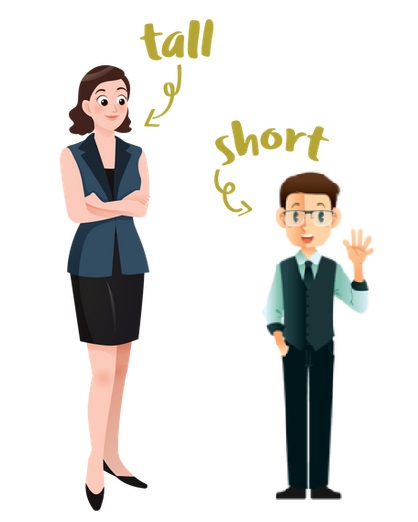I hope you love the products I've recommended below, just a heads up that as an Amazon Associate, I earn from qualifying purchases. This means I may earn commissions on products bought via links on this page.
Some taller people don’t like having the height advantage over others. Many will try all sorts of strange and out there methods to reduce their height. I remember being told as a youngster that you do lose height as you get older. Back then I wasn’t fond on being the tall guy in class. I wasn’t emotionally fit to deal with being tall. So I couldn’t wait until I got older to shed a few inches. But is it really true, do you lose height as you age?.
If you are currently young, this may be a genuine query especially if you are a taller person. But if you are past your youthful days, this question may actually pose some serious health concerns.
The Truth Is….
Are you as tall as you used to be? The truth is, you are probably shorter than you were 10, 20 or even 30 years ago. Like it or not, getting shorter gradually is a part of the natural aging process. Once you have your growth sprout, it’s pretty much all down hill form there. Not necessarily in a bad way of course. However, when there is a rapid decrease in height for men, it can signal some health issues. Some of these issues are an increased risk of heart disease and fractures. So it’s only natural to be concerned if you notice yourself become shorter for no reason at all.
How Much Height Do You Lose As You Get Older
Typically, most adults begin to lose height after they reach the age of 40. In fact, adults lose a quarter up to a third inch in height every ten years, starting in their 40s. The loss in height is due to changes in the joints, muscles and bones. However, the loss in height is generally more noticeable in women.
There are some older adults who lose over an inch in height in a decade, while others don’t begin to notice a loss in height until they are in their 70s. Still others never lose an inch.
We Loose Height Everyday!
This is an interesting fact you may not be aware of. We all loose height every single day. In the morning, you are between 1-2 cm taller than what you will be when bed time comes around. This is not to say you will loose 1-2 cm every day, but a reflection of what daily activities do to our bodies.
Daily activities such as walking, running, exercise causes compression on your joints all day long. Especially on the cartilage in your spine. Gravity also has a hand in the compression as well. By the time bed time comes around, you are relaxed and the pressure is eased on your spine.
Why Do We Get Shorter As We Age Explained
Spinal compression as mentioned above on a daily basis is the major cause for loosing height as you age. The spine has 24 vertebrae and 23 discs in between each vertebrae. There is no disc in between C1 and C2 which is why there is less discs than vertebrae. Anyways, the discs are basically padding, fibril cartilage filled with water.
A lot of people will have their discs degenerate as they age. However, the biggest reason people degenerate as they age is due to improper care of the spine. So over time the discs (padding) will slowly get shorter and shorter. Causing you to shrink with age. But this is not necessarily something you should look forward to. I was wrong to think that getting shorter as I age was a blessing, it’s the opposite.
So it’s important to take care of your spine. Chiropractic will certainly help keep your spine in better alignment and fixation becoming permanent such as two vertebrae becoming stuck together causing hunched back. Which can result in shrinkage of the discs and a reduction in height.
Do We Need To Shrink As We Age?
No, as mentioned above, take care of your spine first and foremost. Keep the fluid level up in your spinal discs to reduce dehydration and shrinkage. No matter what you think about your height, messing with the spine is simply not worth it. Being aware of your posture is detrimental to keeping your spine aligned. Something as simple as using a ball chair to replace your office chair can promote better posture and also encourage better circulation of blood which can relieve pain.
Height Loss Can Equal Health Problems At Any Age
As previously mentioned, a rapid loss in height can signal problems, especially for men. However, is gradual height loss also an indicator of health issues? Unfortunately, it can be. This is the reason why your physician or general health care provider should take your height measurements during your annual health care exams.
Height loss can be very worrisome, especially if it is the result of skeletal conditions like compression fractures. These fractures can limit mobility and cause back pain. However, the person may not feel any pain. Muscle loss can also contribute to a loss in height, and cause additional back pain.
Research has also shown that the greater the shrinkage, the higher the risk for hip fractures and non-vertebral fractures. Other studies have shown that those over the age of 65 who have lost 2 inches or more in the past 10 to 20 years were at a higher risk for hip fractures than those who did not lose as many inches in height.
A loss in height may also be related to physiological and metabolic changes. These changes can negatively impact your health as well.
In some older adults, getting shorter is the result of poor nutrition and/or poor general health. However, there is no need to despair. Many older adults who have diminished stature are and remain healthy.
If you have any concerns about getting shorter, especially if you are dealing with chronic back pain, you should speak with your physician.
What Height Should Be Used Calculate BMI?
Although many people think they should use their current height, medical experts disagree. BMI (Body Mass Index) is the formula that is used to evaluate weight in relation to height. The higher the results, the higher the recommended body fat.
This means that if you get shorter, but your weight remains the same, your BMI will increase. This simple shift can take a person from the healthy weight category to the overweight category.
For example, a female who is around 5 foot 4 inches tall, weighs 140 pounds and has a Body Mass Index of 26.5 is considered to be in the lower range of the overweight category. However, if her height reduces to 5 feet tall, and weighs the same, her BMI will increase to almost 29.
If older adults shrink because of compression of the spine, the body fat must make up for the difference. This makes sense that BMI and waist circumference will also increase.
Loosing Height As We Age Affects Us All
So, is there a way to prevent getting shorter as you age? Unfortunately, genetics and poor posture plays a large role, but there are ways you can help increase your bone density. Be sure to consume enough calcium, eat a whole foods and use height appropriate exercise equipment.






2 thoughts on “Do You Lose Height As You Age”
Hi there,
Great article!
I knew that we lose height when getting older but what I didn’t know is that when there is a sudden height lost, it can be a health issue. Now I understand why my doctor measured my height when I first met him. Just a question, please. You mentioned that walking and running cause compression on the cartilage in the spine. I do walk a lot, 50 minutes per day. Do you think it could have a bad impact on my spine?
Thank you for this excellent post!
Hi Daniella, thanks for stopping by. There are studies that prove that running can cause compression in the spine. For further reading visit: https://www.ncbi.nlm.nih.gov/p…